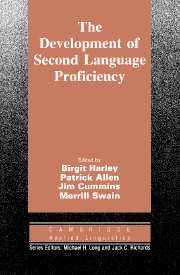Book contents
- Frontmatter
- Contents
- List of contributors
- Series editors' preface
- Acknowledgments
- Introduction
- I THE NATURE OF LANGUAGE PROFICIENCY
- II CLASSROOM TREATMENT
- Chapter 5 Aspects of classroom treatment: toward a more comprehensive view of second language education
- Chapter 6 Process-product research on second language learning in classrooms
- Chapter 7 Analysis and experience as variables in second language pedagogy
- Chapter 8 Response by DBP project members to the discussion papers of Patsy Lightbown and H.H. (David) Stern
- III SOCIAL AND INDIVIDUAL VARIABLES
- IV PRACTICAL AND POLICY IMPLICATIONS
- V THIRTY-FIVE YEARS OF RESEARCH ON BILINGUALISM
- CONCLUSION
- References
- Author Index
- Subject Index
Chapter 8 - Response by DBP project members to the discussion papers of Patsy Lightbown and H.H. (David) Stern
Published online by Cambridge University Press: 05 October 2012
- Frontmatter
- Contents
- List of contributors
- Series editors' preface
- Acknowledgments
- Introduction
- I THE NATURE OF LANGUAGE PROFICIENCY
- II CLASSROOM TREATMENT
- Chapter 5 Aspects of classroom treatment: toward a more comprehensive view of second language education
- Chapter 6 Process-product research on second language learning in classrooms
- Chapter 7 Analysis and experience as variables in second language pedagogy
- Chapter 8 Response by DBP project members to the discussion papers of Patsy Lightbown and H.H. (David) Stern
- III SOCIAL AND INDIVIDUAL VARIABLES
- IV PRACTICAL AND POLICY IMPLICATIONS
- V THIRTY-FIVE YEARS OF RESEARCH ON BILINGUALISM
- CONCLUSION
- References
- Author Index
- Subject Index
Summary
In his discussion paper, David Stern provides a valuable review of the historical development of communicative language teaching. In addition, he clarifies the conceptual distinction between analytic and experiential strategies and discusses the advantages and disadvantages of both. One issue that leads to difficulty is the existence of two distinct approaches to communicative language teaching which are often confused: (1) a functional-analytic approach that emphasizes teaching about communication through the study of speech acts, discourse analysis, and sociolinguistics, and (2) an experiential approach that emphasizes teaching through communication in a natural manner without any prior selection or arrangement of the language items to be learned. Stern points out that the COLT studies did not always succeed in clearly distinguishing these two concepts. For example, “explicit focus on function/discourse/ sociolinguistics” is listed as an experiential feature in the table that served as the basis for rank-ordering the schools in the core French observation study. This was in fact done deliberately in the expectation that talking about discourse coherence and situational appropriateness (in the target language) would constitute a communicatively rich activity. However, with the benefit of hindsight, we agree with Stern that the activities he cites are inherently analytic rather than experiential. This categorization problem did not affect the core French results, since less than 1 percent of observed time was assigned to activities focusing on functional, discourse, or sociolinguistic aspects of language.
Information
- Type
- Chapter
- Information
- The Development of Second Language Proficiency , pp. 110 - 116Publisher: Cambridge University PressPrint publication year: 1990
